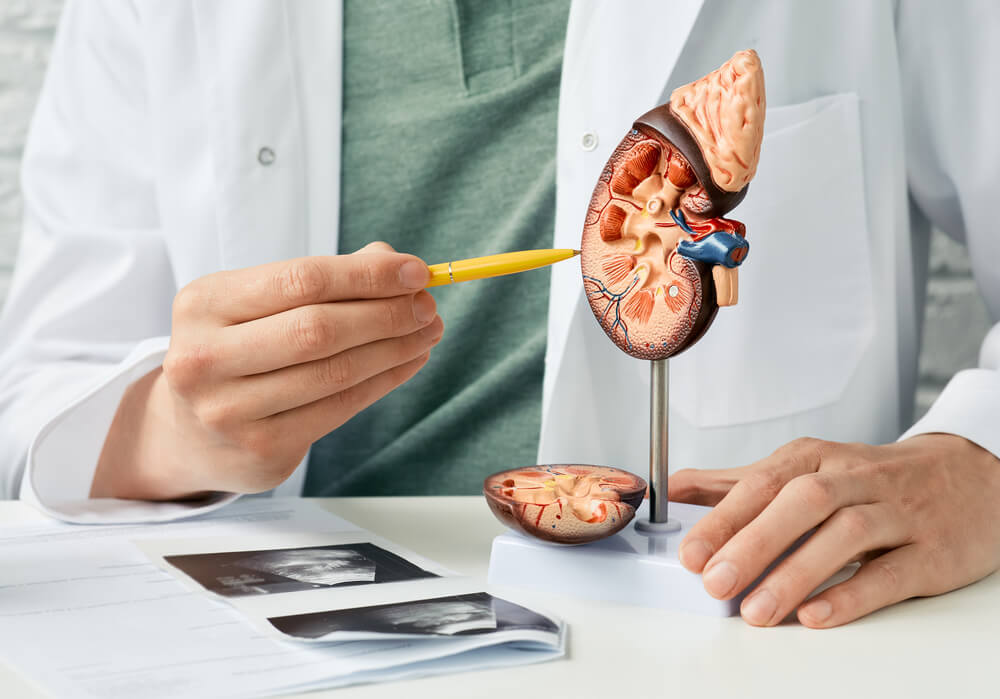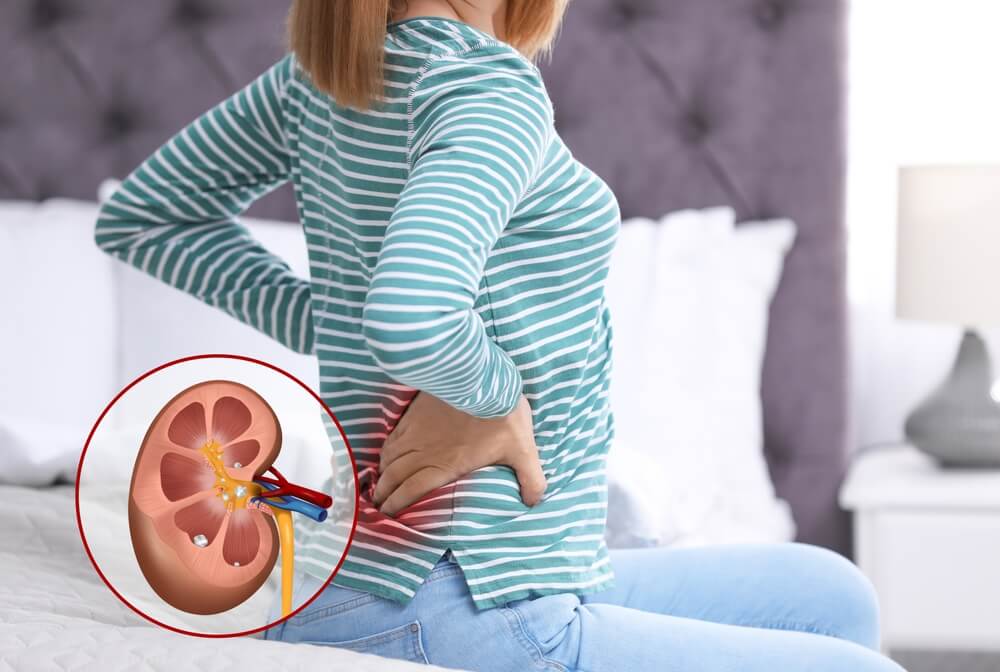Experiencing a kidney stone can be a distressing and often painful occurrence. These hard deposits, formed from mineral and acid salts, build up in your kidneys and must be passed through the urinary tract. They manifest with several symptoms, often including severe flank pain and discomfort during urination, necessitating prompt attention and management for effective relief.
Kidney stones can cause urine blockage and sometimes progress into a more severe condition, like a urinary tract infection, so attending to them is crucial. This is to alleviate the pain and counteract potential complications they might present to overall kidney health.
Rightly so, helping pass a kidney stone episode can feel daunting. However, passing a kidney stone can be managed well with the proper knowledge and the appropriate strategies.
But beyond just dealing with this issue as it arises, wouldn’t knowing how to prevent it in the first place be beneficial? This post will provide valuable insights and tips on managing kidney stone symptoms and effective preventive measures to keep them at bay. For personalized advice, consider consulting with an internal medicine specialist.
Detailed Tips For Passing a Kidney Stone
When it comes to dealing with a kidney stone, effective treatment entails managing pain and facilitating the stone’s successful passage. Depending on many factors, such as stone size, location, and individual health considerations, the treatment approach can vary from medical intervention to natural remedies at home.
Overview of Medical Treatments and Interventions
Medical professionals play a vital role in diagnosing and treating kidney stones. They can assess and determine the extent of the condition using various diagnostic tools like ultrasound or CT scan. Once a stone in the kidney has been identified and its characteristics understood, the appropriate treatment can be recommended.
For larger stones causing significant pain or urine blockage, more invasive procedures may be required. These may involve non-surgical stone removal techniques such as extracorporeal shock wave lithotripsy (ESWL), which uses sound waves to break up the stones into smaller pieces that can be quickly passed.
More complex cases might need a ureteroscopy, where a thin scope is inserted through the urinary tract to remove or break up the stone. With careful post-procedure care, recovery from these interventions is typically swift.
Exploring Natural Ways and Home Remedies to Ease the Passage of Kidney Stones
For smaller stones, medical intervention may not be necessary. Many kidney stones can pass on their own, though this process can be accompanied by some level of discomfort or even pain during urination. Various home remedies can be tried to ease the stone’s passage.
Drinking lots of fluids, especially water, is one of the most helpful strategies. Water can help to flush your urinary system and support the kidney stone’s natural dissolution. A diet low in sodium and rich in vegetables can also be beneficial, reducing the conditions that allow stones to form in the first place. Moreover, over-the-counter pain relievers can be used to manage passing stone pain.
When dealing with kidney stones, it’s essential to recognize the limitations of home remedies. It’s always advisable to consult with a medical professional to ensure that the strategies used are safe and effective for the individual. Sometimes, what starts as a simple stone can escalate into a kidney or urinary tract infection, requiring prompt and appropriate medical attention.
Lifestyle Changes to Prevent Kidney Stones
Prevention is always better than treatment. With kidney stones in mind, incorporating specific lifestyle changes can help decrease the recurrence of this condition. These strategies revolve around diet modifications and healthy habits like staying well-hydrated and exercising regularly.
Nutritional Recommendations and Dietary Changes
Embracing a kidney stone diet can reduce the risk of developing this condition. For starters, a typical kidney stone diet implies decreasing sodium intake. Excessive salt consumption can trigger kidney stones by increasing the calcium your kidneys must filter, creating an environment conducive to stone formation. Opting for fresh foods over processed ones can help keep your sodium intake in check.
Moreover, it’s advisable to consume enough calcium-rich foods in your diet. While it may seem counterintuitive, a lack of calcium can cause kidney stone formation because it can increase the oxalate levels in your body, a leading cause of kidney stones. Include leafy greens, dairy products, and fortified foods in your meals to meet your calcium needs.
Also, limiting animal protein, like red meat, poultry, eggs, and seafood, can reduce uric acid, another contributor to kidney stones. A healthy diet favoring fruits, vegetables, whole grains, and lean proteins can foster kidney health and prevent kidney stones.
The Role of Hydration and Regular Exercise in Prevention
Drinking enough water has multiple health benefits, including preventing kidney stones. Hydration can help dilute the substances that can form stones in the kidneys. Hence, those with a history of kidney stones are often advised to drink at least 12 glasses of fluid daily. Water is best, but citrus-based drinks, like orange juice or lemonade, can also aid in stone prevention.
This is because they contain citrate, which helps prevent stone formation.
Alongside hydration, regular physical activity can contribute positively, too. Exercise promotes calcium transfer from the blood into the bones, reducing calcium in the kidneys and decreasing the risk of stone formation. Combining regular exercise with adequate hydration can deter the formation of kidney stones and promote overall health. As with any health advice, discussing these lifestyle changes with a healthcare provider is always best to ensure they are safe and effective for your specific circumstances.

When to Seek Medical Assistance
Though the tips and lifestyle adjustments shared above can undoubtedly aid in passing and preventing kidney stones, there are times when seeking professional medical help is crucial. Specific kidney stone symptoms can signal that home management may not suffice, and the need for medical intervention is paramount. Moreover, maintaining regular communication with your healthcare provider is essential for optimal kidney health.
Identifying Signs When Home Management is Not Enough
Severe flank pain, persistent pain during urination, visible blood in your urine, or any signs of urinary tract infection, such as fever, chills, and nausea, are among the red flags that warrant immediate medical attention. Additionally, suppose you have been drinking water for stones but aren’t seeing any improvement or worsening symptoms. The situation might require a more aggressive approach, such as a stone removal procedure or nephrolithiasis treatment.
Seeking medical help is limited to severe cases and when the discomfort persistently affects your quality of life or peace of mind. Although kidney stone symptoms can be unsettling, knowing that help is available and that a positive outcome is highly likely with the proper treatment approach is critical.
The Importance of Regular Check-Ups and Maintaining Communication with Your Healthcare Provider
Regular health check-ups are crucial in the management and prevention of kidney stones. They facilitate early detection of potential problems, enabling your healthcare provider to recommend immediate necessary actions. Importantly, for individuals with recurring kidney stones, these check-ups provide an opportunity to evaluate the effectiveness of the current preventive measures and adjust them if necessary.
Moreover, maintaining an open line of communication with your healthcare provider is pivotal. Do not hesitate to report changes in your kidney stone symptoms or ask questions about your health. Your healthcare provider can provide trusted, professional advice on management strategies, dietary changes, and recurrence concerns. Remember: regarding health issues, no problem is too small to share with your provider.
Managing Kidney Stones Effectively
Dealing with kidney stones can indeed feel intimidating. However, they are a medical condition that can be managed effectively with the right approach and lifestyle adjustments. Incorporating sufficient hydration, a kidney-friendly diet, and regular exercise into your daily routine can go a long way in easing the passage of kidney stones or even preventing them altogether. Further, utilizing home remedies and natural strategies can offer substantial relief from symptoms like passing stone pain.
Nevertheless, pay attention to don’t the vital role that professional medical assistance plays in the fight against kidney stones. Prompt healthcare intervention when needed can prevent complications such as urinary tract infection or worsening urine blockage due to stone presence. Hence, it is essential to recognize when home management isn’t enough and to pursue professional help at Carreras Medical Centre.
Embracing personal healthcare responsibility plays a significant part in this journey. Regular health check-ups, keeping informed, and actively participating in managing your health can significantly improve disease outcomes. Open communication with your healthcare provider fosters a team approach that is beneficial for addressing kidney stones or any other health concern.
Remember, kidney stones, while troublesome, don’t have to rule your life. With the right strategies, informed decisions, and preventive measures, you can navigate this health issue, ensuring optimal kidney health and overall well-being. Empower yourself with knowledge, follow through with the recommended changes, and confidently face kidney stones head-on.


